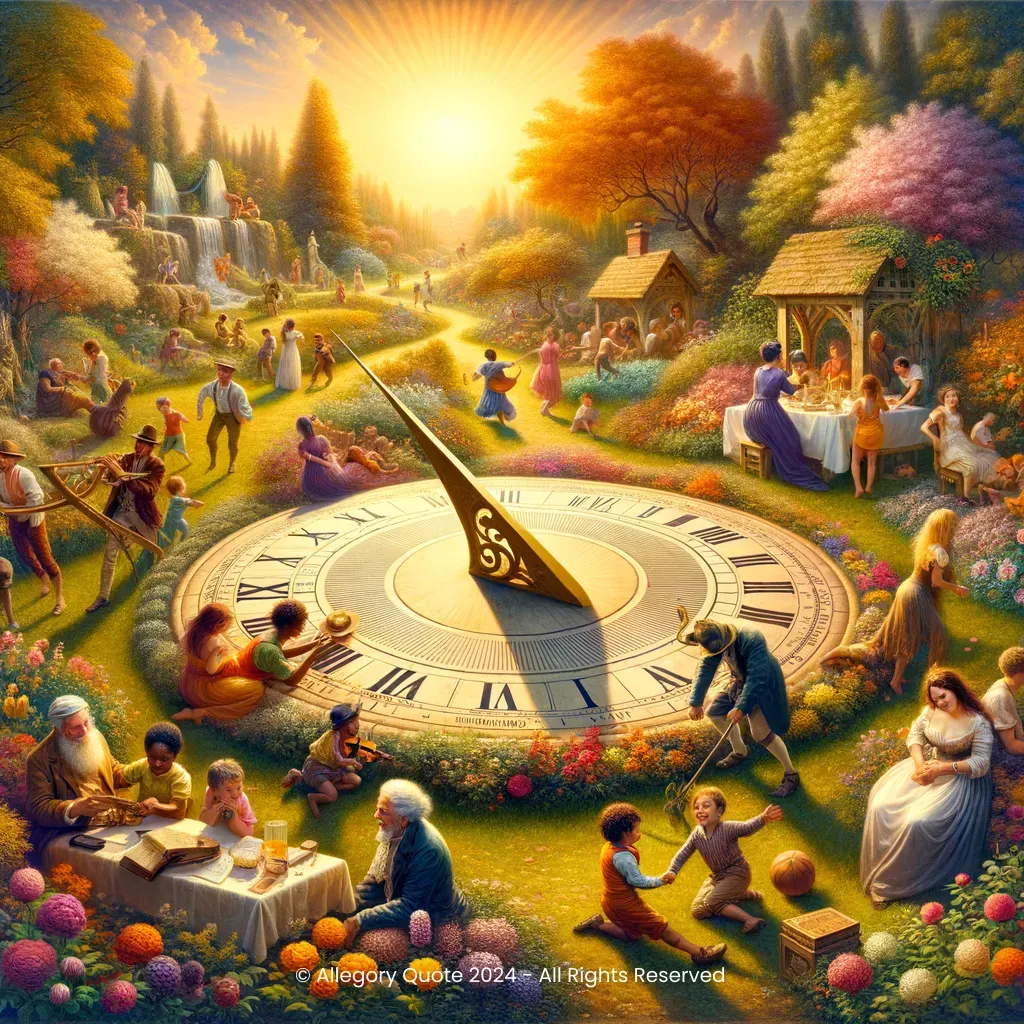Pleasure and action make the hours seem short

0
0
0
0
- Meaning
- The phrase "Pleasure and action make the hours seem short" reflects the subjective experience of time. When one is engaged in enjoyable or stimulating activities, time appears to fly by quickly. This contrasts with the psychological phenomenon where time seems to drag during mundane or unenjoyable tasks. It touches on the psychological understanding of how our perception of time can change based on our engagement and emotional state. Philosophically, it underscores the importance of living an active and fulfilling life, as pleasurable experiences and meaningful actions can make our time feel more fleeting and precious.
- Allegory
- The vibrant garden represents a place of natural beauty and joy, symbolizing environments where one engages in pleasurable activities. The sundial, an ancient time-keeping device, signifies the passage of time and how it becomes almost unnoticeable amidst enjoyment. The people participating in various joyful activities depict the action that complements pleasure, emphasizing engagement in life. The warm, golden light adds a sense of fulfillment and happiness, capturing the essence of time well-spent. The serene landscape with blooming flowers and lush greenery symbolizes growth and the flourishing of life when it is filled with pleasure and action.
- Applicability
- This phrase can be a guiding principle for daily life, suggesting that one should seek out pleasure and stay active to have a more fulfilling and satisfying experience. Balancing responsibilities with activities that bring joy will contribute to a more positive perception of time. For instance, pursuing hobbies, spending time with loved ones, or engaging in work that you are passionate about can make the days feel shorter and more joyful.
- Impact
- This phrase, like many of Shakespeare's lines, has had a lasting impact on literature and popular culture. It encapsulates a human truth that has resonated across centuries. The concept is often referenced in discussions about time management, psychology, and the pursuit of happiness. It has also been quoted in various forms within films, literature, and motivational contexts, reinforcing its widespread influence.
- Historical Context
- The phrase originates from the early 17th century and is part of Shakespeare's play "Othello," which was written between 1601 and 1604. This was a period marked by the transition from the Renaissance to the early modern period in Europe, characterized by significant developments in arts, culture, and sciences. Shakespeare's works often reflect the human condition and societal norms of his time while containing universal themes that remain relevant.
- Criticisms
- There are minimal criticisms of this phrase itself; however, some might argue that it oversimplifies the complexity of time perception and satisfaction in life. Those with differing views might emphasize the importance of moments of reflection and stillness, suggesting that not every hour needs to be filled with action or pleasure to be valuable. Conversely, some critics may point out that not everyone has the same access to pleasurable activities or the freedom to choose their actions due to socio-economic constraints.
- Variations
- Variations of this phrase might be found in various cultures, each expressing the idea that engagement and enjoyment in activities quicken the perception of time. In Japanese culture, for instance, there's an expression "楽しい時間は早く過ぎる" (Tanoshii jikan wa hayaku sugiru), which translates to "Pleasant times pass quickly." Despite cultural differences, the concept of time perception remains universally understood.
-

It is better to be alone than in bad company.
-

Reputation is an idle and most false imposition; oft got without merit, and lost without deserving.
-

Love is blind, and lovers cannot see the pretty follies that themselves commit.
-

Journeys end in lovers meeting.
-

With mirth and laughter let old wrinkles come.
-

False face must hide what the false heart doth know.
-

What a piece of work is a man! How noble in reason, how infinite in faculty!
-

They stumble that run fast.
-

Nothing will come of nothing.
-

How poor are they that have not patience! What wound did ever heal but by degrees?
-

All's well that ends well.
-

Love all, trust a few, do wrong to none.
No Comments